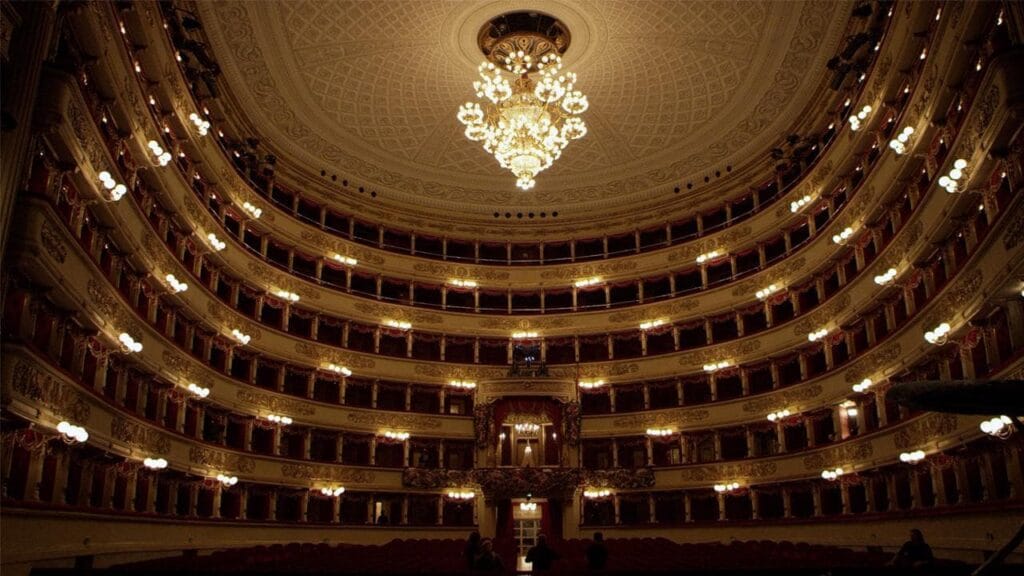Few theatres in the world evoke such awe as Teatro alla Scala in Milan. Known simply as La Scala, this opera house is more than a performance venue – it is a testament to Italian cultural heritage, musical innovation, and artistic mastery. Since its inauguration in the late 18th century, La Scala has stood as a beacon for composers, singers, dancers, and conductors, defining the global standards of opera and ballet.
The origins of teatro alla Scala Milan: from tragedy to grandeur
La Scala’s story begins with tragedy. In 1776, a devastating fire destroyed Milan’s Teatro Regio Ducale, leaving the city without a theatre. Empress Maria Theresa of Austria commissioned a new one to replace it, appointing architect Giuseppe Piermarini to design it. The site chosen was that of the former Church of Santa Maria alla Scala, from which the theatre takes its name.
Completed in just two years, La Scala opened on August 3, 1778, with Antonio Salieri’s L’Europa riconosciuta. Its design was revolutionary, with a horseshoe-shaped auditorium ensuring perfect acoustics and visibility, while elegant tiers of gilded boxes and red velvet seats reflected the luxury of the Milanese aristocracy.
La Scala’s role in Opera history
From its earliest days, La Scala became the stage where Italian opera evolved. Giuseppe Verdi premiered many of his works here, including Nabucco in 1842, which transformed him into a national hero. Although Verdi often clashed with the theatre’s management, he recognised La Scala’s importance and returned repeatedly to debut his masterpieces.
Giacomo Puccini, another giant of Italian opera, saw the premieres of Madama Butterfly and Turandot here, while Gaetano Donizetti and Vincenzo Bellini also contributed to the theatre’s illustrious repertoire. La Scala’s impact on opera was not limited to Italy; it set global standards for performance quality, staging, and interpretation that continue to influence productions worldwide.
Architectural marvel and acoustic perfection
What sets La Scala apart is its perfect blend of beauty and functionality. The auditorium, with its opulent chandeliers, stucco decorations, and velvet drapes, creates an intimate yet majestic atmosphere. Its horseshoe shape distributes sound evenly, making it one of the best acoustically engineered theatres in the world.
La Scala underwent significant renovations in the early 2000s under architect Mario Botta, who modernised its backstage and rehearsal areas while preserving its historic façade and auditorium. Today, it stands as a seamless fusion of heritage and technology.

The demanding audience: a tradition of excellence
Performing at La Scala is a dream for any artist, but it comes with the theatre’s famous tradition of critical audiences. Known for their knowledge and passion, Milanese opera-goers are quick to applaud brilliance but equally unafraid to boo underwhelming performances. For singers and conductors, earning the approval of a La Scala audience is a career-defining milestone.
La Scala’s ballet academy: nurturing future stars
Beyond opera, La Scala is home to one of the world’s most prestigious ballet schools, the Accademia Teatro alla Scala. Established in 1813, it has trained generations of dancers who perform on stages worldwide. The academy maintains rigorous standards, blending classical technique with modern choreography to create versatile and world-class artists.
Visiting Teatro alla Scala Milan today
Today, Teatro alla Scala remains an essential destination for travellers to Milan. Visitors can:
- Attend a performance: Experience the magic of opera or ballet in its authentic setting.
- Explore the Museo Teatrale alla Scala: This museum houses costumes, original set designs, instruments, and portraits narrating centuries of Italian musical history. It offers insight into the legends who have graced its stage.
To fully appreciate La Scala’s legacy, join a dedicated guided experience.
Book your tour here: Milan La Scala Tour
Why Teatro alla Scala should be on your Milan itinerary
La Scala is not just for opera enthusiasts; it is a journey into the artistic soul of Italy. Its architecture, history, and performances combine to create an unforgettable cultural experience. Whether you are attending a world-class opera, admiring costumes in the museum, or simply standing under its grand chandelier, you will feel the centuries of passion that make La Scala a timeless icon.
